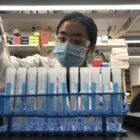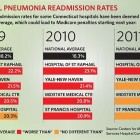I-Team In-Depth
No Longer A Pipe Dream: State In Line For $150m To Replace Lead Service Lines
|
As soon as he heard that President Biden’s Bipartisan Infrastructure Act would include more than $4 billion to replace lead water pipes in the country, Joseph Lanzafame, New London’s public utilities director, knew two things:
First, no matter how much money Washington spent on the undertaking, it wouldn’t be enough. And second, Lanzafame knew he wanted New London to be first on the state’s priority list for funding. “If we get out ahead of it,” he said, “we’re more likely to get additional subsidies … and we’re going to help set the standard for the state.”
Over the past two years, New London has been aggressively inventorying its pipes, the first step in the replacement process. Lanzafame has pored over historical records, hired engineers to do predictive modeling, and arranged for exploratory “test pits” to be drilled throughout the city to determine how many of its public water lines are made of lead.




